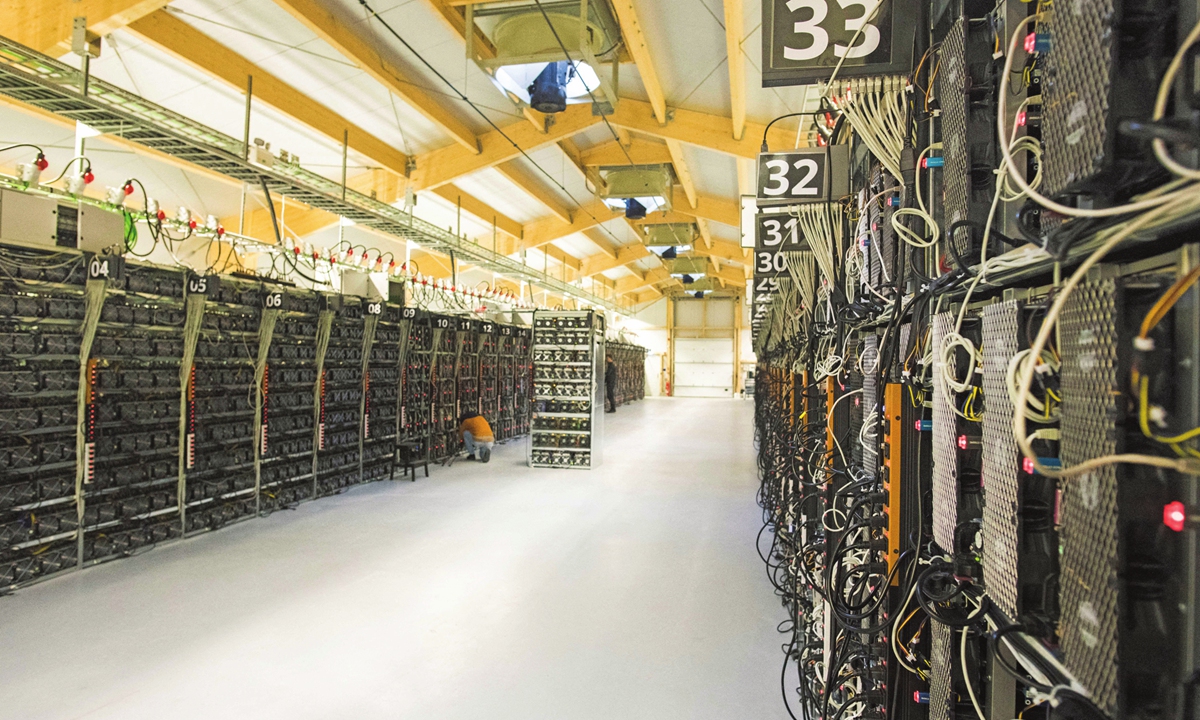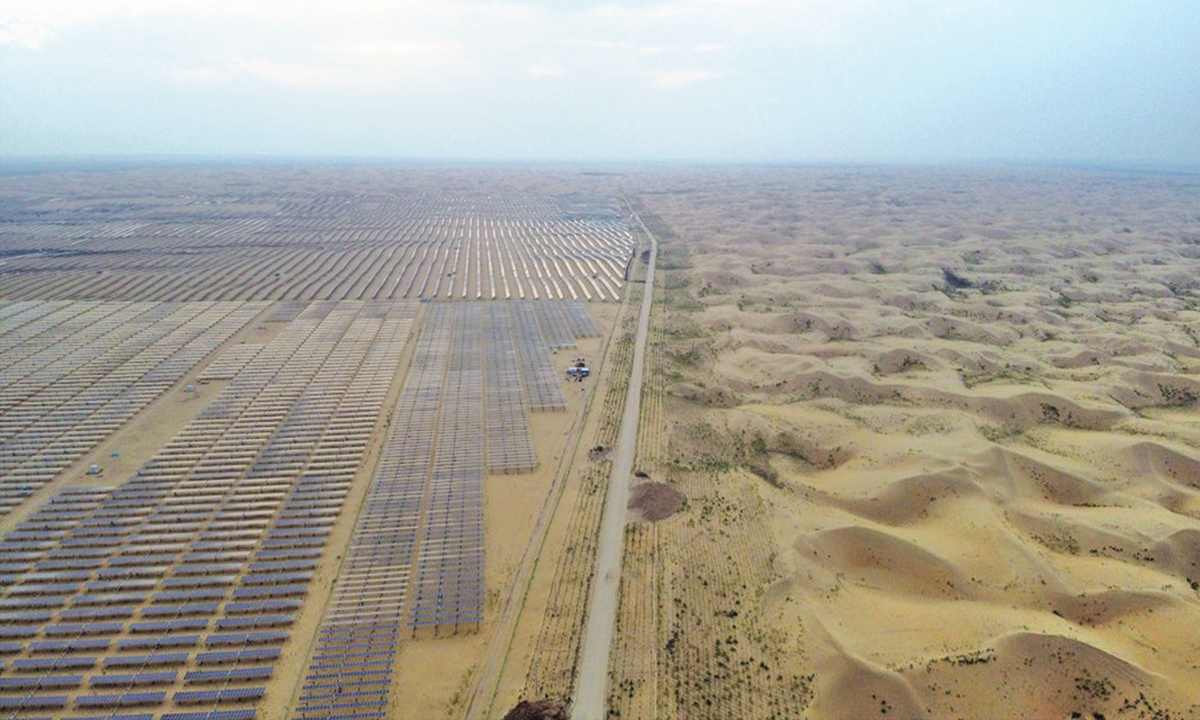The global hysteria over Bitcoin has caused concern about the connections between mining cryptocurrency and climate change. As China has become a leading miner in the world, recent research by Chinese scientists was published to remind the cost of mining Bitcoin on China's carbon reduction efforts, while some local governments have acted to tackle the mines in order to reduce the use of power in this fledgling industry.
Bitcoin mining has exploded as the value of the virtual coins has surpassed $60,000 as of press time, and some optimistic investors are expecting it to surpass $100,000 soon.
There has also been a fever of mining Bitcoin in China, and with capitals joining in, and Bitcoin mining factories emerging, China has become the world's largest miner - research found that more than 75 percent of Bitcoin mining happens in China.
Recent research published earlier this month in the scientific journal Nature Communications has demonstrated the fact that Bitcoin mining could "potentially undermine the emission reduction effort" in China.

China announced its projection to reach its carbon peak in 2035 and hit carbon neutrality by 2060.
The researchers noted that this emission output would exceed the total annualized greenhouse gas emission output of some smaller countries, such as the Czech Republic and Qatar.
The research drew international attention after being published. Some media outlets doubted whether the Bitcoin mining industry might finally shake China's targets on carbon peak and neutrality. "Bitcoin's soaring popularity could have a long-lasting negative effect on the environment," said CNN.
But researchers reached by the Global Times said that the aim of doing such a study was to remind the world that a new industry as Bitcoin blockchain could bring huge risks to the environment. But they have faith in China's wills to fulfill the goals on carbon issues.
"Every bit of energy is precious," said Guan Dabo, an expert of Climate Change Economics at the Department of Earth System Science, Tsinghua University, told the Global Times. Guan is an author of the research.
Though the industry remains a grey zone in many aspects, the Chinese government does not turn a blind eye to it and some local regions have begun to act. North China's Inner Mongolia Autonomous Region has announced to clear up all the Bitcoin mines before May. Previously, the region was the major hub for Bitcoin mining due to the cheap electricity.
The mines might relocate to other regions of China, chasing low cost on electricity.
Cooling the craze
Dalad Banner, a rarely heard of name for a small town with a population of 300,000 in Inner Mongolia, had been Bitcoin mining sacred land. A large Bitcoin mine here could make 1/20 yield of the world's Bitcoin mining every day in 2017.
Dalad Banner belongs to Ordos, Inner Mongolia. The region has a small population but is rich in energy. In the past years, wealth-chasers poured into the city.
A Cambridge study said that Inner Mongolia could account for 8 percent of the global Bitcoin yield, even higher than the US at 7.2 percent. At the peak time, there were 25,000 mining machines in Ordos working non-stop, and the electricity would amount to more than 100 million yuan ($15.3 million) a year.
Moreover, mining could barely contribute to the local economy. Some mining factories even applied for subsidies and electricity discounts, some favorable government policies offered to high-tech industries, in the name of "big data analysis," the China Youth Daily reported.

As early as 2019, Inner Mongolia has ordered its local governments to check and clear Bitcoin mines.
And recently, the region published a plan to completely close the "mining" projects of virtual currencies at the end of April and will strictly ban new similar projects. It targets to reduce 14-15 percent of energy per GDP in the 14th Five-Year Plan period (2021-25).
Insiders said that many mines in Inner Mongolia have moved to other parts of China - Northwest China's Gansu Province and Xinjiang Uygur Autonomous Region, as well as Southwest China's Sichuan Province.
The relocation has shown its effect. Sichuan, rich in hydropower, is expected to see a 150 percent increase in electricity use in 2021 as its Bitcoin mining could use 11.3 billion kWh of electricity this year, the local electricity trade department noted.
However, though hydropower is considered as clean energy, it does not mean China has spare electricity to power such a huge amount of Bitcoin mining, Guan noted. This past winter, due to huge pressure from heating and post-pandemic economic rehabilitation, some parts of China experienced limited use of electricity.
A game of money
Authors of the research noted that even though Bitcoin mining is new, it has to have a green attribution. They also demonstrated suggestions for policymakers for better management of the industry.
Bitcoin mining relies on secondary energy. The industry itself can hardly lift its carbon reduction demand, Guan said, noting that "The industry is driven by capital. It's a game of money. The miners are unable to think about environmental issues, only profits."
Guan noted that Bitcoin could help explore technology and practice digital currency in China, but the current crazy situation has brought negative effects.
Bitcoin mining is a newly-founded industry without any thought of low carbon. It is currently developing on the route of "pollute first, manage later" like many other industries in the past. "We would like to show people this," Guan said.
What is behind Bitcoin mining is Blockchain technology, which is widely regarded as one of the most promising and attractive technologies for a variety of industries, such as supply chain finance, production operation management, logistics management, the first author of the paper Jiang Shangrong, a PhD candidate at the School of Economics and Management, University of Chinese Academy of Sciences, told the Global Times.
Jiang believes more vigilance is needed to better regulate this field.

They considered three Bitcoin regulation policies. The first one is to ban inefficient, profit-making miners from China's Bitcoin mining market. The second is to persuade mines in coal-based energy regions to move away to hydro-based energy regions and use hydropower to mine during sufficient water seasons. The third is to double carbon tax and severely penalize high carbon emissions from Bitcoin mining.
The study found that the second policy for Bitcoin miners are the most effective way to reduce carbon emissions.
Struggling for space
But for now, the storm in Inner Mongolia failed to shake "gold diggers."
"Bitcoin is still appreciating, and investors are increasing," an anonymous bitcoin mining machine retailer told the Global Times. "Local regions need to sell their electricity. They won't totally close [the mining pools]."
Measures against big mining pools inadvertently brought extra opportunities for individual miners. Peter, living in South China's Guangdong Province, said that the small miners like him might have higher income if the bigger miners are "withdrawn" by the country.
Even mining machine manufacturers are making promises.
The industry should work together to promote a greener mining industry and work with local governments to achieve a win-win situation. Only in this way can the process of mining compliance be really promoted, Canaan, one of China's three largest mining machine suppliers and also the second-largest global mining manufacturer, said.
According to Canaan, China has been occupying a leading position in the global Bitcoin mining development. Three Chinese mining machine manufacturers can supply the vast majority of the whole network computing power.
But some Bitcoin experts believe the direction of these policies, as well as the principle of Bitcoin's development, could lead to another result.

"In the context of China's carbon-neutral goal, it can be said that the development space of the Bitcoin mining industry is very small domestically, as facing stricter environmental supervision, energy costs and mining equipment's operating costs will increase. Relative reduction of mining profits will limit the industry's development," Chen Bo, director of the Digital Finance Research Center at the Central University of Finance and Economics, told the Global Times on Monday.
At present, it is difficult to successfully apply for a license to operate a Bitcoin mining machine, as Chen learned.
However, the Bitcoin mining industry itself has always been a high-risk, high-yield gray area in China. As long as there are still profits to chase, there will be people doing it. Chen believes that the energy-guzzling industry will not disappear entirely, and mines would be moved to areas where clean energy is cheaper.
According to Chen, many Bitcoin mines have indeed been moved from Inner Mongolia to the Yunnan-Guizhou-Sichuan area in the past year.
However, as China deepens its transition to a low-carbon economy and more industries increasingly demand for clean energy such as hydropower, there won't be much hydropower left for the gray industry of Bitcoin mining.
"On the whole, no provinces or cities are likely to welcome Bitcoin mines for tax purposes anymore," Chen noted.
Bitcoin mining has exploded as the value of the virtual coins has surpassed $60,000 as of press time, and some optimistic investors are expecting it to surpass $100,000 soon.
There has also been a fever of mining Bitcoin in China, and with capitals joining in, and Bitcoin mining factories emerging, China has become the world's largest miner - research found that more than 75 percent of Bitcoin mining happens in China.
Recent research published earlier this month in the scientific journal Nature Communications has demonstrated the fact that Bitcoin mining could "potentially undermine the emission reduction effort" in China.

Inside a Bitcoin mining factory Photo: AFP
The annual energy consumption of the Bitcoin blockchain in China is expected to peak in 2024 at 296.59 Twh and generate 130.50 million metric tons of carbon emission correspondingly, according to the research, which was jointly made by researchers from the Chinese Academy of Sciences (CAS) and Tsinghua University.China announced its projection to reach its carbon peak in 2035 and hit carbon neutrality by 2060.
The researchers noted that this emission output would exceed the total annualized greenhouse gas emission output of some smaller countries, such as the Czech Republic and Qatar.
The research drew international attention after being published. Some media outlets doubted whether the Bitcoin mining industry might finally shake China's targets on carbon peak and neutrality. "Bitcoin's soaring popularity could have a long-lasting negative effect on the environment," said CNN.
But researchers reached by the Global Times said that the aim of doing such a study was to remind the world that a new industry as Bitcoin blockchain could bring huge risks to the environment. But they have faith in China's wills to fulfill the goals on carbon issues.
"Every bit of energy is precious," said Guan Dabo, an expert of Climate Change Economics at the Department of Earth System Science, Tsinghua University, told the Global Times. Guan is an author of the research.
Though the industry remains a grey zone in many aspects, the Chinese government does not turn a blind eye to it and some local regions have begun to act. North China's Inner Mongolia Autonomous Region has announced to clear up all the Bitcoin mines before May. Previously, the region was the major hub for Bitcoin mining due to the cheap electricity.
The mines might relocate to other regions of China, chasing low cost on electricity.
Cooling the craze
Dalad Banner, a rarely heard of name for a small town with a population of 300,000 in Inner Mongolia, had been Bitcoin mining sacred land. A large Bitcoin mine here could make 1/20 yield of the world's Bitcoin mining every day in 2017.
Dalad Banner belongs to Ordos, Inner Mongolia. The region has a small population but is rich in energy. In the past years, wealth-chasers poured into the city.
A Cambridge study said that Inner Mongolia could account for 8 percent of the global Bitcoin yield, even higher than the US at 7.2 percent. At the peak time, there were 25,000 mining machines in Ordos working non-stop, and the electricity would amount to more than 100 million yuan ($15.3 million) a year.
Moreover, mining could barely contribute to the local economy. Some mining factories even applied for subsidies and electricity discounts, some favorable government policies offered to high-tech industries, in the name of "big data analysis," the China Youth Daily reported.

A photovoltaic power station in Dalad Banner, Ordos of North China's Inner Mongolia Autonomous Region. Photo: IC
As early as 2019, Inner Mongolia has ordered its local governments to check and clear Bitcoin mines.
And recently, the region published a plan to completely close the "mining" projects of virtual currencies at the end of April and will strictly ban new similar projects. It targets to reduce 14-15 percent of energy per GDP in the 14th Five-Year Plan period (2021-25).
Insiders said that many mines in Inner Mongolia have moved to other parts of China - Northwest China's Gansu Province and Xinjiang Uygur Autonomous Region, as well as Southwest China's Sichuan Province.
The relocation has shown its effect. Sichuan, rich in hydropower, is expected to see a 150 percent increase in electricity use in 2021 as its Bitcoin mining could use 11.3 billion kWh of electricity this year, the local electricity trade department noted.
However, though hydropower is considered as clean energy, it does not mean China has spare electricity to power such a huge amount of Bitcoin mining, Guan noted. This past winter, due to huge pressure from heating and post-pandemic economic rehabilitation, some parts of China experienced limited use of electricity.
A game of money
Authors of the research noted that even though Bitcoin mining is new, it has to have a green attribution. They also demonstrated suggestions for policymakers for better management of the industry.
Bitcoin mining relies on secondary energy. The industry itself can hardly lift its carbon reduction demand, Guan said, noting that "The industry is driven by capital. It's a game of money. The miners are unable to think about environmental issues, only profits."
Guan noted that Bitcoin could help explore technology and practice digital currency in China, but the current crazy situation has brought negative effects.
Bitcoin mining is a newly-founded industry without any thought of low carbon. It is currently developing on the route of "pollute first, manage later" like many other industries in the past. "We would like to show people this," Guan said.
What is behind Bitcoin mining is Blockchain technology, which is widely regarded as one of the most promising and attractive technologies for a variety of industries, such as supply chain finance, production operation management, logistics management, the first author of the paper Jiang Shangrong, a PhD candidate at the School of Economics and Management, University of Chinese Academy of Sciences, told the Global Times.
Jiang believes more vigilance is needed to better regulate this field.

Photo: IC
"China is determined to develop the blockchain industry vigorously. How to make the industry develop toward a more sustainable and green direction is the problem this study wants to solve," Jiang noted.They considered three Bitcoin regulation policies. The first one is to ban inefficient, profit-making miners from China's Bitcoin mining market. The second is to persuade mines in coal-based energy regions to move away to hydro-based energy regions and use hydropower to mine during sufficient water seasons. The third is to double carbon tax and severely penalize high carbon emissions from Bitcoin mining.
The study found that the second policy for Bitcoin miners are the most effective way to reduce carbon emissions.
Struggling for space
But for now, the storm in Inner Mongolia failed to shake "gold diggers."
"Bitcoin is still appreciating, and investors are increasing," an anonymous bitcoin mining machine retailer told the Global Times. "Local regions need to sell their electricity. They won't totally close [the mining pools]."
Measures against big mining pools inadvertently brought extra opportunities for individual miners. Peter, living in South China's Guangdong Province, said that the small miners like him might have higher income if the bigger miners are "withdrawn" by the country.
Even mining machine manufacturers are making promises.
The industry should work together to promote a greener mining industry and work with local governments to achieve a win-win situation. Only in this way can the process of mining compliance be really promoted, Canaan, one of China's three largest mining machine suppliers and also the second-largest global mining manufacturer, said.
According to Canaan, China has been occupying a leading position in the global Bitcoin mining development. Three Chinese mining machine manufacturers can supply the vast majority of the whole network computing power.
But some Bitcoin experts believe the direction of these policies, as well as the principle of Bitcoin's development, could lead to another result.

A worker checks on Bitcoin mining equipment at a facility in the Garze Tibetan Autonomous Prefecture, Southwest China's Sichuan Province. File photo: VCG
"In the context of China's carbon-neutral goal, it can be said that the development space of the Bitcoin mining industry is very small domestically, as facing stricter environmental supervision, energy costs and mining equipment's operating costs will increase. Relative reduction of mining profits will limit the industry's development," Chen Bo, director of the Digital Finance Research Center at the Central University of Finance and Economics, told the Global Times on Monday.
At present, it is difficult to successfully apply for a license to operate a Bitcoin mining machine, as Chen learned.
However, the Bitcoin mining industry itself has always been a high-risk, high-yield gray area in China. As long as there are still profits to chase, there will be people doing it. Chen believes that the energy-guzzling industry will not disappear entirely, and mines would be moved to areas where clean energy is cheaper.
According to Chen, many Bitcoin mines have indeed been moved from Inner Mongolia to the Yunnan-Guizhou-Sichuan area in the past year.
However, as China deepens its transition to a low-carbon economy and more industries increasingly demand for clean energy such as hydropower, there won't be much hydropower left for the gray industry of Bitcoin mining.
"On the whole, no provinces or cities are likely to welcome Bitcoin mines for tax purposes anymore," Chen noted.





